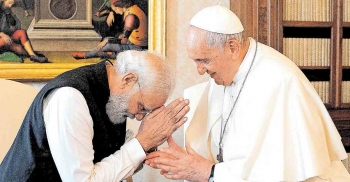
.png) Dr Suresh Mathew
Dr Suresh Mathew

The meeting between Pope Francis and Narendra Modi is a welcome step. The saying “It is better late than never” seems to be the spirit behind the camaraderie displayed between the heads of the largest religion and the largest democracy at the former’s private meeting hall in Vatican City.
A request from various Church authorities to the Modi government for inviting the Pope to India was pending since 2014 when the BJP-led government assumed power at the Centre. For some mysterious reasons, it took seven years for the government to extend the invitation which has promptly been accepted by the Pope.
In between Pope Francis had visited the neighbouring countries like Bangladesh, Sri Lanka and Myanmar but had to skip India, the land of close to 3 crore Christians, for lack of an invitation. Hence, expectations ran high from the time when the news about the meeting was broken on the public domain.
At a time when the Christians in India are faced with multi-pronged attacks from Hindutva forces, it is natural for the community to expect the topic to come up on the table as a part of the agenda for discussion. The miniscule community has been facing the ire of Sangh Parivar offshoots in their homes, worshipping places, and institutions.
The deepening religious intolerance in the country has pushed down India’s ranking in religious freedom and human rights ever since the ascension of the Modi regime in 2014. Hardening their stance on religious freedom, most of the BJP-ruled States have come up with stringent anti-conversion laws which are an affront to the freedom to profess, practice and propagate religion guaranteed in the Constitution.
The Karnataka government is going one step ahead ordering survey of Christian worshipping places and institutions in the State. Hence, it was natural for the community to expect the issue to figure during the Pope-Modi meeting. It is not without any reason that a national newspaper covered the meeting with the cryptic headline “Did you discuss Fr. Stan, PM”.
The impact of the substantive talk between the two top leaders will be decided by its fruitfulness. Its result will be judged by the changes seen on the ground. One gets to know a tree by its fruits; in the same vein, the success of the meeting will be judged by the results flowing from it.
Unfortunately, the day the Prime Minister was hugging the Pope with extended hands and extending an invitation to him to visit India, one of the top leaders of the RSS, Dattatreya Hosabale, made it clear that people who are converted will have to announce it publically.
His statement is atrocious and ultra vires to say the least.
It is an accepted fact that one’s faith or religion is a purely personal affair and this is guaranteed under the Constitution. Any assertion or policy decision that goes against the Constitutional provisions is illegal.
It is impossible for the leopard to change its spots. It seems to be asking for the moon for the Sangh Parivar to discard its century-old anti-minority stance. There lies the biggest hurdle for India to be a truly secular nation. If the Pope-Modi talks could put the country on its secular path, taking a diversion from the road to Hindu Rashtra, that would be the biggest takeaway from the Vatican meet.